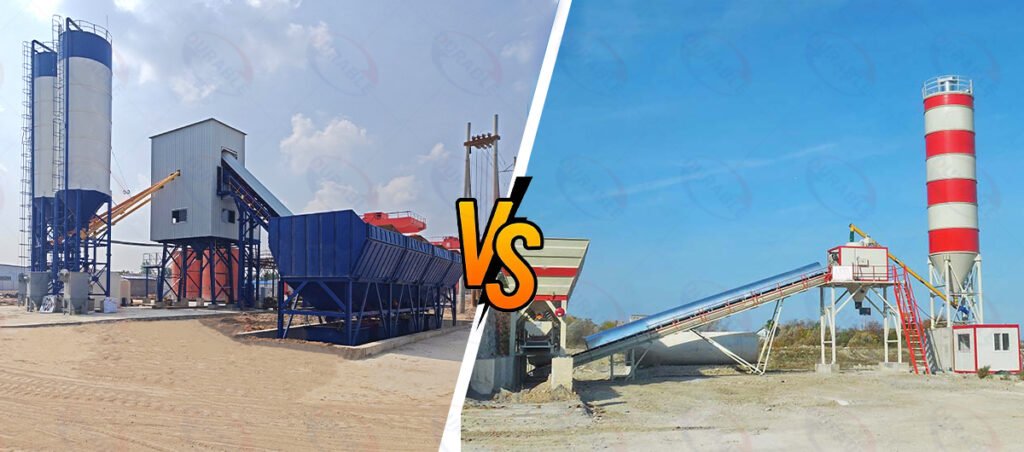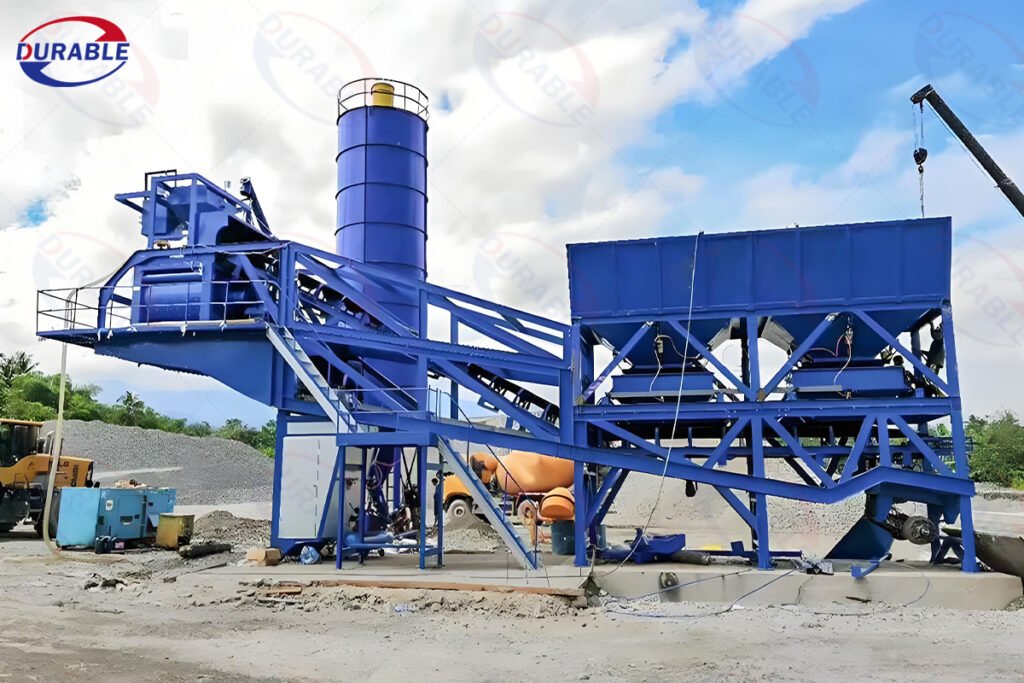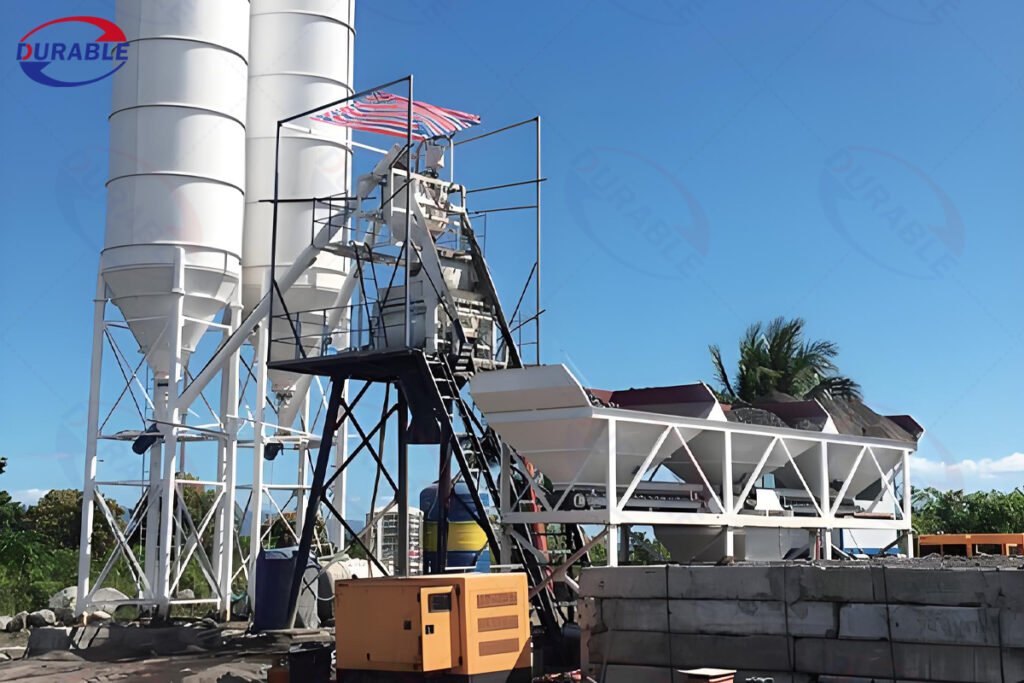Which Concrete Mixing Plant Saves Cost? A Full Comparison
When you start planning a new operation, the first question is always about the concrete mixing plant cost. It’s the biggest line item in your budget. But as a manufacturer at Durable who has advised on hundreds of plant setups, I urge you to ask a better question: “Which plant will make me the most money over its lifetime?” This is the key difference between focusing on price and focusing on profitability.
The choice between a mobile concrete mixing plant and a stationary concrete mixing plant is one of the most critical decisions you will make. A common mistake is to only compare the initial equipment quotations. To find a truly cost-saving concrete mixing plant, you must analyze the Total Cost of Ownership (TCO). This guide will provide a detailed cost-benefit comparison to help you with your choosing mixing plant type decision.
Table of Contents
- Why is Total Cost of Ownership (TCO) More Important Than Initial Price?
- Which Plant Has a Lower Initial Investment?
- Which Plant Type Offers Better Value for Money?
- How Does Project Duration Affect Your Final Cost?
- Which Plant is More Efficient in Daily Operations?
- How Do Land and Foundation Costs Impact Your Choice?
- Which Plant Offers Better Long-Term Financial Value?
- Are There Other Cost-Saving Options Besides Mobile and Stationary Plants?
- Common Questions About Mixing Plant Costs
- Summary: Choose the Plant That Fits Your Business Strategy
- About Durable
- Let’s Analyze Your Concrete Mixing Plant Cost
Why is Total Cost of Ownership (TCO) More Important Than Initial Price?
Total Cost of Ownership includes every cost associated with the plant over its entire life, not just the initial purchase price.
Focusing only on the initial concrete mixing plant price is a common mistake. A cheaper plant can become incredibly expensive if it has high operating costs, frequent downtime, or low resale value. A truly cost-saving concrete mixing plant is one that minimizes your expenses and maximizes your profit over its 15-20 year lifespan.
TCO includes:
- Initial Investment: Equipment price, shipping, installation, and foundation costs.
- Operational Costs: Labor, energy (fuel/electricity), daily maintenance, and wear parts.
- Downtime Costs: Lost revenue and repair expenses when the plant is not running.
- Relocation Costs: The cost to move the plant if your business model requires it.
- Depreciation & Resale Value: How much value the plant retains over time.
By analyzing the TCO, you get a complete financial picture, allowing for a much smarter choosing of mixing plant type.
Which Plant Has a Lower Initial Investment?
When looking purely at the initial investment, a dry mix plant or a mobile plant will almost always have a lower total startup cost than a traditional wet mix stationary plant. The savings come from two different areas: the core equipment itself and the site preparation costs. Understanding both is key to identifying the lowest-cost entry point for your business.
Dry Mix vs. Wet Mix Plants: The Core Equipment Cost

The most significant equipment cost difference is the presence or absence of a central mixer. A wet mix plant’s price includes a large, heavy, and expensive twin-shaft mixer, which is the heart of the operation. This single component, with its powerful motors, heavy-duty gearbox, and wear-resistant liners, can account for a substantial portion of the equipment budget.
A dry mix plant, or transit mix plant, eliminates this component entirely. It simply weighs the aggregates, cement, and water before discharging them directly into a mixer truck, which performs the mixing en route to the job site. This fundamental simplicity makes the upfront concrete mixing plant price for a dry mix plant significantly lower than for a wet mix plant of the same hourly capacity.
Mobile vs. Stationary Plants: The Installation Cost


The second major cost factor is site preparation, and this is where the mobile concrete mixing plant offers huge savings. A traditional stationary concrete mixing plant requires extensive and expensive civil works. This involves pouring deep, reinforced concrete foundations for the mixing tower, silos, and other structures, a process that can add tens of thousands of dollars and weeks to the project timeline.
A mobile plant is engineered to operate on a simple, flat concrete slab or even hard-packed ground. It arrives on its own wheeled chassis, and setup is a matter of days, not weeks. While the mobile plant equipment can be slightly more expensive than its stationary equivalent due to the integrated chassis, the massive savings on foundation costs almost always result in a lower total initial investment.
To make it clear, here is a comparison of the typical startup cost profiles:
| Cost Factor | Wet Mix Stationary | Dry Mix Stationary | Wet Mix Mobile | Dry Mix Mobile |
|---|---|---|---|---|
| Equipment Price | Highest | Medium | High | Lowest |
| Foundation Cost | Very High | High | Very Low / None | Very Low / None |
| Installation Speed | Slowest | Slow | Fast | Fastest |
| Total Startup Cost | Highest | Medium | Low | Lowest |
Which Plant Type Offers Better Value for Money?
When we talk about “value for money” or cost-performance ratio, we’re looking for the best return on every dollar you invest. This goes far beyond the initial price. The best value comes from a plant that balances low installation and transfer costs with efficient operation and a long, profitable service life. Let’s break down how the different plant types perform in these critical areas.
Installation and Relocation Costs
The mobile concrete mixing plant is the undisputed winner for low installation and relocation costs. This is one of its core design advantages. The cost of a stationary concrete mixing plant isn’t just the machine; it includes weeks of civil engineering to create deep foundations. Once built, this investment is permanent. Moving a stationary plant is so expensive and complex that it’s rarely a viable option.
In contrast, a mobile concrete mixing plant is built on a wheeled chassis. You tow it to the site, stand it up, connect utilities, and you can be producing concrete in a matter of days. This saves you an enormous amount of money on foundations and drastically reduces setup time. More importantly, when a project ends, you can simply pack it up and move it to the next job, preserving your asset’s value and flexibility. This ability to “follow the money” provides incredible long-term value.
Operation and Energy Costs
For high-volume, long-term operations, the stationary plant typically has lower operating and energy costs per cubic meter. Stationary plants are designed for pure efficiency. Layouts are optimized for the shortest material travel distances. They support larger aggregate bins and cement silos, which means your wheel loader works less, saving fuel and labor.
Furthermore, a powerful, central twin-shaft concrete mixer is more energy-efficient at mixing large batches than the drum of a transit truck. It achieves a perfect mix faster, reducing wear and tear on your truck fleet and allowing for quicker dispatch times. When you combine this with advanced automation systems that minimize material waste and reduce labor requirements, the long-term mixing plant operating cost of a stationary plant is hard to beat for a permanent ready-mix business.
Service Life and Payback Period
Your choice here depends on your definition of return: stationary plants offer a longer service life, while mobile plants offer a much faster payback period. A stationary plant is built for endurance. It’s a heavy-duty industrial machine designed to run consistently for 20+ years in one location. Its mixing plant ROI is realized slowly but steadily over this long lifespan by producing millions of cubic meters of concrete at a low operational cost.
A mobile plant, while also durable, is designed for a life that includes transport and re-assembly. Its greatest financial strength is the speed of its payback. Because the initial investment is lower and it can be deployed directly at large, profitable projects, you can often recoup your entire investment within a single project. Its high resale value further reduces the long-term financial risk, making it a very valuable and liquid asset.
| Value Factor | Stationary Concrete Mixing Plant | Mobile Concrete Mixing Plant |
|---|---|---|
| Installation Cost | High (Foundations) | Low (Slab/Hardstand) |
| Relocation Ability | Very Poor / Impractical | Excellent |
| Operating Efficiency | Excellent (Optimized Layout) | Good (Compact Design) |
| Service Life | 20+ Years | 10-15+ Years |
| Payback Period | Slower (Long-term) | Faster (Project-based) |
| Resale Value | Low | High |
How Does Project Duration Affect Your Final Cost?
The duration of your projects is a critical factor. Stationary plants are built for long-term, continuous operation in one place, while mobile plants excel in project-based work.
Your business model should dictate your choosing of mixing plant type.
- Long-Term Projects (5+ years): If you are establishing a ready-mix concrete plant to supply a city or a large region for many years, a stationary concrete mixing plant is the most cost-effective choice. Its robust structure, larger storage capacity, and optimized workflow are designed for decades of high-volume production from a single location. The high initial setup cost is spread out over many years of operation, resulting in a lower cost per cubic meter.
- Short-Term Projects (6 months – 2 years): For contractors working on specific projects like highway construction, dams, or airports, a mobile concrete mixing plant is the clear winner. The ability to quickly set up, produce concrete for the project’s duration, and then move to the next site is invaluable. The savings on repeated foundation construction and the speed of deployment far outweigh the higher equipment price.
Which Plant is More Efficient in Daily Operations?
Stationary plants generally offer higher production efficiency and lower unit production costs due to their larger scale and optimized layout.
When it comes to the daily mixing plant operating cost, the stationary plant often has the edge. A stationary concrete mixing plant can be designed with a larger footprint, allowing for bigger aggregate stockpiles, taller cement silos, and a more streamlined workflow. This often translates to higher production capacity (up to 240 m³/h or more) and greater operational efficiency. The cost of labor and energy per cubic meter of concrete produced can be lower in a high-volume stationary setup.
A mobile concrete mixing plant, by contrast, is designed for compactness, not maximum throughput. Its production capacity is typically smaller (from 25 to 90 m³/h). While it is highly efficient for its size, its primary advantage is flexibility, not the absolute lowest unit production cost. For a business focused on maximizing daily output from a central location, the stationary plant is the more efficient choice.
How Do Land and Foundation Costs Impact Your Choice?
Land and foundation costs can be a massive, often underestimated, part of the total concrete mixing plant cost, and this is where mobile plants offer huge savings.
The cost of preparing the site for a stationary concrete mixing plant can be substantial. You need to:
- Acquire or lease a large piece of land permanently.
- Conduct soil testing and site preparation.
- Excavate and pour deep, steel-reinforced concrete foundations for every major component.
This process is time-consuming, expensive, and creates a permanent structure.
A mobile concrete mixing plant drastically reduces these costs. It requires a smaller, often temporary, plot of land. Most importantly, it is engineered to be self-supporting, eliminating the need for expensive foundations. This is a primary reason why a foundation-free mixing plant is a highly cost-saving concrete mixing plant option for project-based contractors. The savings in time and direct costs can amount to tens of thousands of dollars.
Which Plant Offers Better Long-Term Financial Value?
Mobile plants retain higher resale value and avoid relocation costs, while stationary plants offer a lower depreciation cost if they are operated continuously.
Looking at the long-term mixing plant ROI requires considering asset value over time.
- Mobile Concrete Mixing Plant: Because of its flexibility and self-contained nature, a well-maintained YHZS mobile mixing plant has a very strong resale market. Contractors are always looking for used mobile plants for new projects. Its value is in its ability to be redeployed. The cost of moving it is relatively low—you simply tow it to the next site.
- Stationary Concrete Mixing Plant: An HZS concrete mixing plant is a fixed asset. Once installed, the cost to dismantle, transport, and re-erect it is enormous, often making relocation financially impractical. Its value is tied to the land and the business it supports. As a result, its resale value as a standalone piece of equipment can be lower. However, for a business that operates it for 20+ years, its steady production and lower initial equipment price provide excellent long-term value. For a different mobile solution, a self-loading concrete mixer also offers high flexibility and resale value.
Are There Other Cost-Saving Options Besides Mobile and Stationary Plants?
Yes, the “foundation-free” or compact plant offers a hybrid solution that balances cost, performance, and ease of installation.
Recognizing the need for a middle ground, manufacturers like Durable Machine offer foundation-free mixing plant models. These are technically stationary plants but are designed with a modular, bolted structure that allows them to be assembled on a simple concrete slab without the need for deep, traditional foundations.
This type of plant offers several cost-saving benefits:
- Lower Installation Costs: It dramatically reduces the time and money spent on civil works.
- Faster Setup: It can be assembled much more quickly than a traditional stationary plant.
- Relocation Feasibility: While not as simple to move as a wheeled mobile plant, it can be dismantled and relocated to a new site far more economically than a conventional stationary plant.
This option is an excellent cost-saving concrete mixing plant choice for businesses that need the high capacity of a stationary plant but also desire greater flexibility and lower setup costs.
Common Questions About Mixing Plant Costs
Question 1: What is the typical price range for a mobile concrete mixing plant?
The concrete mixing plant price for a YHZS mobile mixing plant can range from $50,000 for a small 25 m³/h model to over $200,000 for a larger 90 m³/h model, depending on the configuration and components.
Question 2: How much can I save on foundation costs with a mobile plant?
Foundation costs for a medium-sized stationary plant can easily exceed $30,000 to $50,000. A mobile or foundation-free plant can reduce this cost by over 90%, representing a massive upfront saving.
Question 3: Is the operating cost of a mobile plant higher?
Per cubic meter, the mixing plant operating cost for a mobile plant might be slightly higher than a large, highly efficient stationary plant due to its smaller scale. However, this is usually offset by the savings in transport, setup, and labor for project-based work.
Question 4: Can a mobile plant produce the same quality of concrete?
Absolutely. High-quality mobile plants from reputable manufacturers use the same powerful twin-shaft concrete mixers and accurate weighing systems as their stationary counterparts. There is no compromise on the quality of the concrete produced.
Summary: Choose the Plant That Fits Your Business Strategy
Ultimately, the most cost-saving concrete mixing plant is the one that aligns perfectly with your business plan. There is no single “cheaper” option.
- Choose a Mobile Plant if: Your business is based on serving multiple, temporary construction projects. Your priority is rapid deployment, minimal site preparation costs, and flexibility.
- Choose a Stationary Plant if: You are establishing a long-term ready-mix business to supply a permanent market. Your priority is maximum production efficiency, economies of scale, and the lowest possible cost per cubic meter over many years.
By focusing on the Total Cost of Ownership and matching the plant’s strengths to your operational needs, you can make a truly cost-effective investment that will be the foundation of a profitable business.
About Durable
As a leading manufacturer since 2001, Durable Machine provides a complete range of concrete mixing solutions, including high-performance mobile concrete mixing plants (YHZS series) and robust stationary concrete mixing plants (HZS series). We engineer our plants for durability, efficiency, and a low Total Cost of Ownership. Our factory-direct model ensures you get the best value, backed by expert support to help you choose and operate the most profitable plant for your business.
Let’s Analyze Your Concrete Mixing Plant Cost
Are you ready to make a smart investment? Contact our team today. We will help you conduct a thorough cost-benefit analysis based on your specific projects and business goals, and provide a detailed quotation for the most cost-saving concrete mixing plant for your needs.
 Durable Machinery
Durable Machinery